Guinea pigs are adorable and lovable creatures that make excellent pets. These little creatures have specific nutritional needs, and it’s essential to understand what foods are safe for them to eat. One of the big questions is whether or not guinea pigs can eat beans. In this article, we will explore the suitability of beans in guinea pig diets.
While beans are an excellent source of fiber and protein, adding them to your guinea pig’s diet can have adverse effects on their digestive system. This article will delve into the nutritional needs of guinea pigs and why beans should not be included in their regular diet.
Key Takeaways:
- Guinea pigs require a diet rich in vitamin C, fiber, and low in fats and sugars.
- Beans have a high protein and fiber content which can strain guinea pig’s digestive system causing gastrointestinal issues.
- Feeding beans to guinea pigs can potentially cause bloating, gas, and discomfort.
- Safe and nutritious alternatives such as fresh vegetables, fruits, and a small amount of high-quality guinea pig pellets should make up the majority of their diet.
- It is important to establish a well-rounded balanced diet for guinea pigs and to consult a veterinarian for personalized advice based on their specific needs and health conditions.
The Nutritional Needs of Guinea Pigs
Guinea pigs, like all animals, require a balanced diet to maintain their overall health and well-being. A proper diet is vital to keeping your furry friend happy and healthy.
Guinea pigs require a diet that is rich in vitamin C, fiber, and low in fats and sugars. Vitamin C is essential to prevent scurvy, a common condition among guinea pigs. To ensure they have enough vitamin C, guinea pigs need to consume fresh fruits and vegetables daily. Fiber is also crucial for gut health, as it helps move food through their digestive system.
It’s important to avoid feeding guinea pigs foods that are high in fats and sugars, such as nuts and seeds, as these can lead to obesity and other health issues. Instead, offer them a variety of hay, fresh vegetables, fruits, and high-quality guinea pig pellets.
Hay
Hay should make up a significant portion of your guinea pig’s diet. Timothy hay is a popular choice, as it is high in fiber and low in calories. Other types of hay, such as orchard grass or meadow hay, can also be fed to provide variety and added nutrients.
Fruits and Vegetables
Fresh fruits and vegetables are an excellent source of vitamins and minerals for guinea pigs. Some safe vegetables include bell peppers, cucumbers, and dark leafy greens like kale and spinach. Safe fruits include apples, strawberries, and kiwi. Remove any uneaten fruits and vegetables after 24 hours to prevent spoilage.
Pellets
High-quality guinea pig pellets should make up a small portion of your guinea pig’s diet. Look for pellets that are specifically designed for guinea pigs, as they contain the necessary vitamins and minerals they require. Avoid pellets that contain seeds, nuts, or artificial preservatives.
Offering your guinea pig a balanced diet consisting of hay, fresh vegetables, fruits, and pellets is crucial to their health and happiness. However, it is important to introduce new foods gradually to avoid any digestive issues. Consult with a veterinarian who specializes in small animals for specific dietary recommendations for your guinea pig.
Types of Beans
When it comes to feeding guinea pigs, different types of beans can have varying levels of nutritional value and potential risks. Some common types of beans include kidney beans, black beans, pinto beans, and green beans. While beans generally provide a good source of protein and fiber, guinea pigs have specific nutritional requirements that may not be fully met by beans.
For instance, green beans are a safe option for guinea pigs as they are low in fat and high in fiber. However, other bean varieties may contain substances like lectins and phytic acid that can be difficult for guinea pigs to digest. As such, it is important to evaluate each type of bean individually to determine its suitability for guinea pigs.
Nutritional Content of Beans
Beans are a good source of protein and fiber, minerals like iron and potassium, and vitamins like vitamin B6 and folate. However, they may not be ideal for guinea pigs due to the presence of lectins and phytic acid.
Lectins are a type of protein that can interfere with digestion and nutrient absorption, while phytic acid can bind to minerals, making them unavailable for absorption by the body.
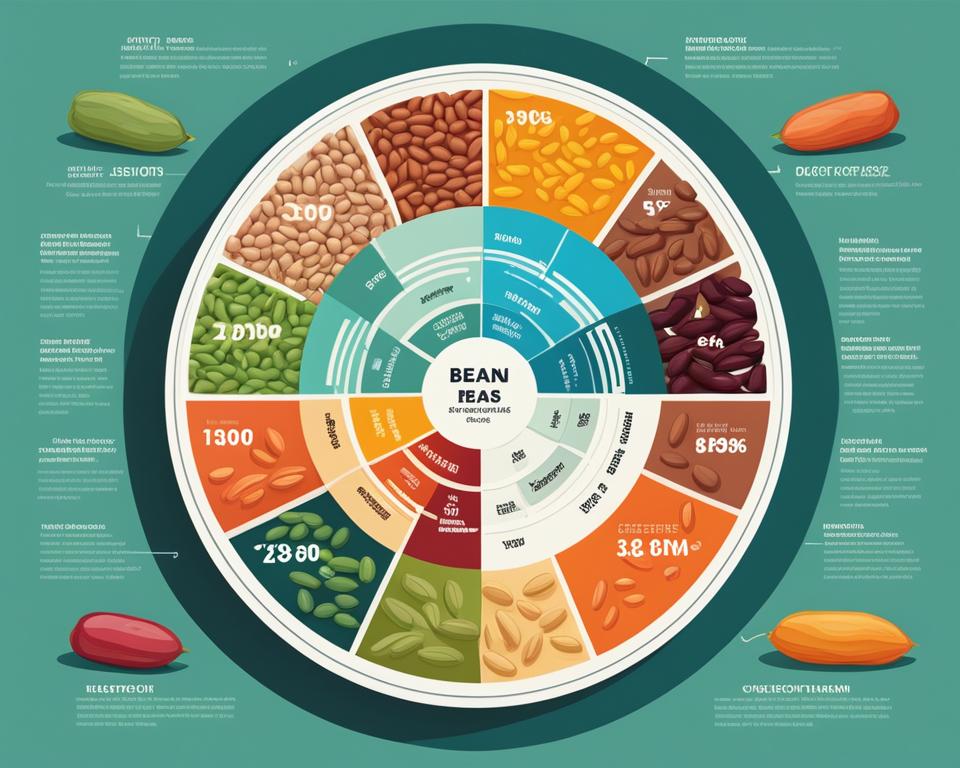
Effects of Lectins and Phytic Acid on Guinea Pigs
Guinea pigs have sensitive digestive systems, and consuming lectins and phytic acid may cause gastrointestinal issues such as bloating, gas, and discomfort. Additionally, the presence of phytic acid may interfere with the absorption of important minerals such as calcium, which is essential for a guinea pig’s growth and development.
Recommended Serving Size of Beans for Guinea Pigs
Given the potential risks associated with feeding beans to guinea pigs, it is not recommended to include them in their regular diet. If you still want to feed your guinea pig beans, do so in small amounts and infrequently. It is safer to stick to a diet consisting of hay, fresh vegetables, fruits, and guinea pig pellets to provide them the necessary nutrients without risking their health.
Can Guinea Pigs Eat Beans?
Guinea pigs have specific nutritional needs, and it is important to understand what foods are suitable for them and which ones should be avoided. While beans can technically be included in their diet, it is not recommended to do so regularly. The high protein and fiber content in beans may strain their digestive system, leading to gastrointestinal issues. Moreover, the presence of lectins and phytic acid could be potentially harmful, affecting their overall health and well-being.
Potential Risks of Feeding Beans to Guinea Pigs
While it may be tempting to share some beans with your guinea pig, there are potential risks to consider. Beans can cause bloating, gas, and discomfort in guinea pigs due to their high fiber and protein content, which may strain their digestive system. Additionally, legumes like beans can contain substances like lectins and phytic acid that can interfere with calcium absorption, which can be detrimental to a guinea pig’s health.
It is best to avoid feeding beans to your guinea pig altogether to ensure their well-being. Instead, consider offering safe and nutritious alternatives such as fresh vegetables like bell peppers, cucumbers, and leafy greens, or fruits like apples and strawberries that can provide the necessary vitamin C.
Safe Alternatives to Beans for Guinea Pigs
While beans may not be the best option for guinea pigs, there are plenty of safe and nutritious alternatives. Vegetables like bell peppers, cucumbers, and leafy greens should be a staple in your guinea pig’s diet as they are packed with essential vitamins and minerals. Fruits such as apples and strawberries are not only high in vitamin C, but also make for a tasty treat for your furry friend. Here are some other safe food options for your guinea pig:
- Carrots
- Celery
- Broccoli
- Parsley
Remember to introduce new foods gradually and always keep an eye out for any digestive issues or adverse reactions. A well-balanced diet will keep your guinea pig healthy, happy, and active.
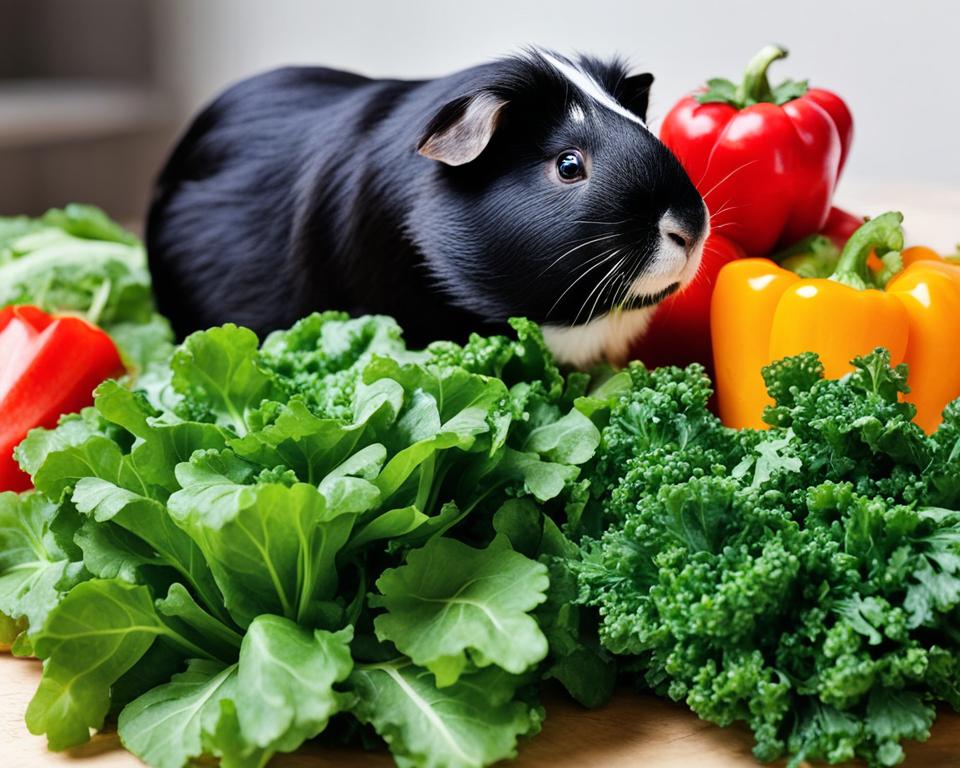
Establishing a Balanced Diet for Guinea Pigs
Guinea pigs have specific nutritional needs, and a balanced diet is essential to maintain their overall health. Their diet should include hay, fresh vegetables, fruits, and a small amount of high-quality guinea pig pellets.
Hay should make up the majority of their diet, as it provides essential fiber for proper digestion. Fresh vegetables like bell peppers, cucumbers, and leafy greens are excellent sources of nutrients and add variety to their diet. Fruits like apples and strawberries provide the necessary vitamin C guinea pigs need.
When choosing pellets, look for high-quality options that are specifically formulated for guinea pigs and do not contain added sugars or artificial preservatives. Pellets should only make up a small portion of your guinea pig’s diet, as overfeeding can lead to obesity and other health issues.
Ensuring a well-rounded menu that meets all of your guinea pig’s nutritional needs is crucial for their health. Providing fresh water and monitoring their food intake closely will ensure they stay healthy and happy.
Introducing New Foods to Guinea Pigs
Guinea pigs can enjoy a variety of different foods, including fruits and vegetables. However, it’s important to introduce new foods to their diet gradually to minimize the risk of upset stomachs and other digestive issues. When introducing new foods to your guinea pig, start with small portions and observe for any adverse reactions. If your furry friend seems to enjoy the new food and has no negative reaction, you can gradually increase the portion size.
Tip: To ensure your guinea pig gets a balanced diet, offer a variety of different vegetables and fruits, and avoid feeding them the same thing every day. This also helps prevent boredom and encourages them to eat a wider variety of healthy foods.
Remember to always provide fresh, clean water and hay, which should make up the bulk of your guinea pig’s diet. When choosing fruits and vegetables to offer your pet, make sure they are safe for guinea pigs to eat. Some examples of safe foods include kale, carrots, and apples. Avoid giving them foods that are high in sugar or fat, and never feed your guinea pig chocolate or caffeinated drinks!
Signs of Digestive Issues in Guinea Pigs
Guinea pigs can experience digestive issues that can impact their health and well-being. Be aware of these signs and contact a veterinarian if any of them appear:
- Changes in appetite
- Weight loss
- Diarrhea
- Constipation
If you notice any of these symptoms in your guinea pig, it is essential to act quickly and seek proper diagnosis and treatment from a qualified veterinarian.
Consulting a Veterinarian
If you are unsure about your guinea pig’s dietary needs or have any concerns about their health, it is always best to consult a veterinarian. A veterinarian who specializes in small animals can provide personalized advice based on your guinea pig’s specific needs and health conditions. They can also determine if there are any underlying health issues that could affect your guinea pig’s diet.
During your visit, the veterinarian may perform a physical examination or recommend diagnostic tests to assess your guinea pig’s overall health. They can also provide guidance on establishing a balanced diet that meets all of your guinea pig’s nutritional requirements.
Remember, regular visits to a veterinarian are essential to your guinea pig’s health and well-being. They can help ensure that your furry friend stays happy and healthy throughout their life.
Conclusion
In conclusion, while guinea pigs can technically consume beans, it is not advisable to include them in their regular diet due to the potential risks associated with their digestive system and the presence of harmful substances. It is crucial to understand a guinea pig’s nutritional requirements, which consist of a vitamin C-rich diet, low in fats and sugars, and rich in fiber. A balanced diet consisting of hay, fresh vegetables, fruits, and high-quality guinea pig pellets is crucial for their overall health and well-being.
It is essential to gradually introduce new foods to a guinea pig’s diet to prevent digestive issues and to pay close attention to signs of possible digestive problems such as changes in appetite, weight loss, diarrhea, or constipation. If any of these symptoms occur, it is recommended to consult a veterinarian who specializes in small animals for proper diagnosis and treatment.
Remember, a guinea pig’s diet is a critical aspect of their care, and seeking professional advice from a veterinarian is always a good idea. By providing a balanced and nutritious diet, you can ensure your furry friend lives a happy and healthy life.
FAQ
Can guinea pigs eat beans?
While guinea pigs can technically eat beans, it is not recommended to include them in their regular diet. The high protein and fiber content may strain their digestive system, leading to gastrointestinal issues. Additionally, the presence of lectins and phytic acid could potentially be harmful.
What are the nutritional needs of guinea pigs?
Guinea pigs require a diet rich in vitamin C, fiber, and low in fats and sugars. A balanced diet is essential for their overall health and well-being.
What are the types of beans suitable for guinea pigs?
There are various types of beans available, such as kidney beans, black beans, pinto beans, and green beans. It’s important to evaluate their suitability individually for guinea pigs.
What is the nutritional content of beans?
Beans are generally rich in protein, fiber, and minerals like iron and potassium. However, they can also contain substances like lectins and phytic acid, which may not be ideal for guinea pigs.
What are the potential risks of feeding beans to guinea pigs?
Feeding beans to guinea pigs can potentially cause bloating, gas, and discomfort. These legumes may also interfere with calcium absorption, which can be detrimental to a guinea pig’s health.
What are the safe alternatives to beans for guinea pigs?
Instead of beans, safe and nutritious alternatives for guinea pigs include vegetables like bell peppers, cucumbers, and leafy greens. Additionally, fruits like apples and strawberries can provide the necessary vitamin C.
How can I establish a balanced diet for guinea pigs?
To meet the nutritional needs of your guinea pig, it’s important to establish a balanced diet. Along with hay, fresh vegetables, fruits, and a small amount of high-quality guinea pig pellets should make up the majority of their diet.
How should I introduce new foods to guinea pigs?
Guinea pigs have sensitive digestive systems, so introducing new foods should be done gradually. Start with small portions of new vegetables or fruits and observe for any adverse reactions to avoid upset stomachs and digestive issues.
What are the signs of digestive issues in guinea pigs?
Signs of digestive problems in guinea pigs may include changes in appetite, weight loss, diarrhea, or constipation. If you observe any of these symptoms, consult a veterinarian for proper diagnosis and treatment.
Should I consult a veterinarian for my guinea pig’s diet?
If you have any concerns about your guinea pig’s diet, it is recommended to consult a veterinarian who specializes in small animals. They can provide personalized advice based on your guinea pig’s specific needs and health conditions.

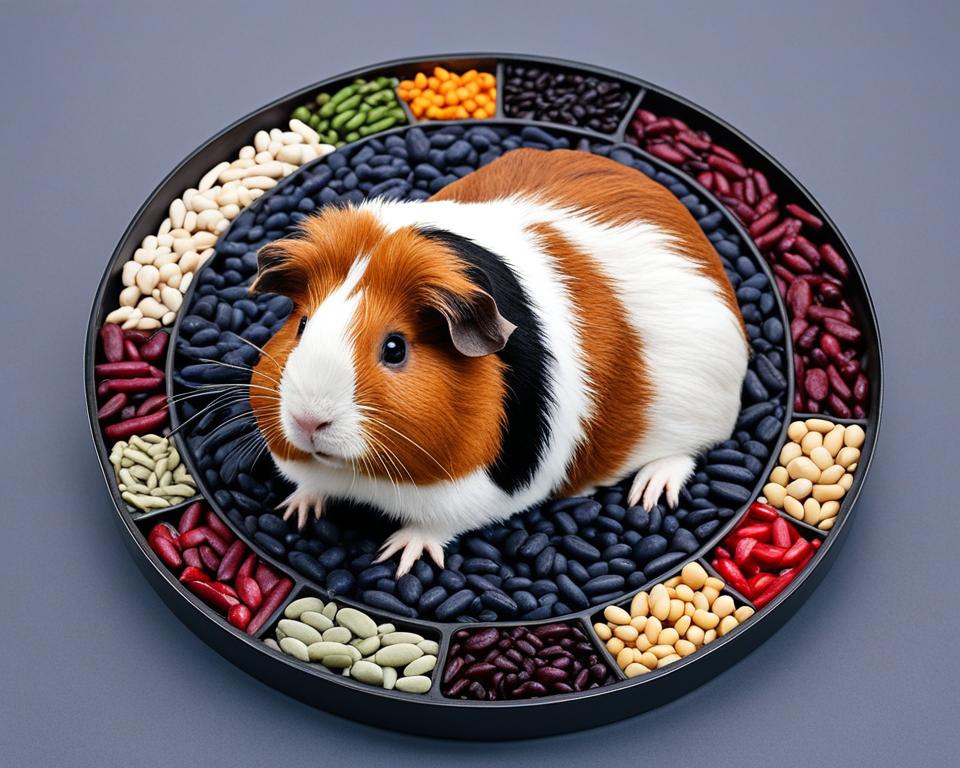
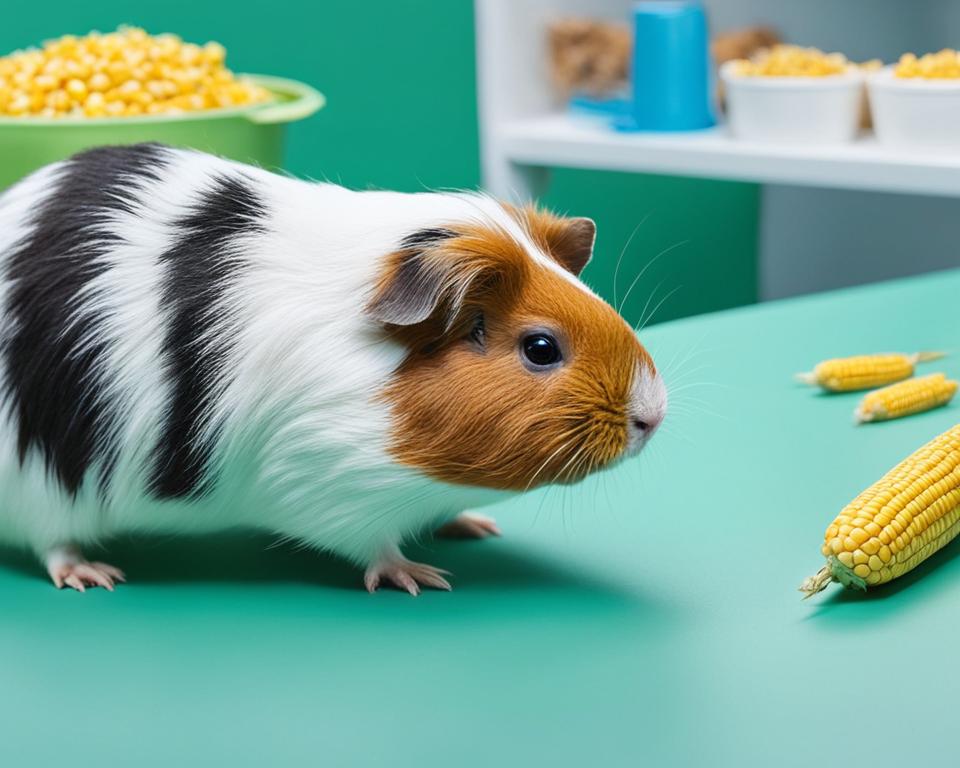
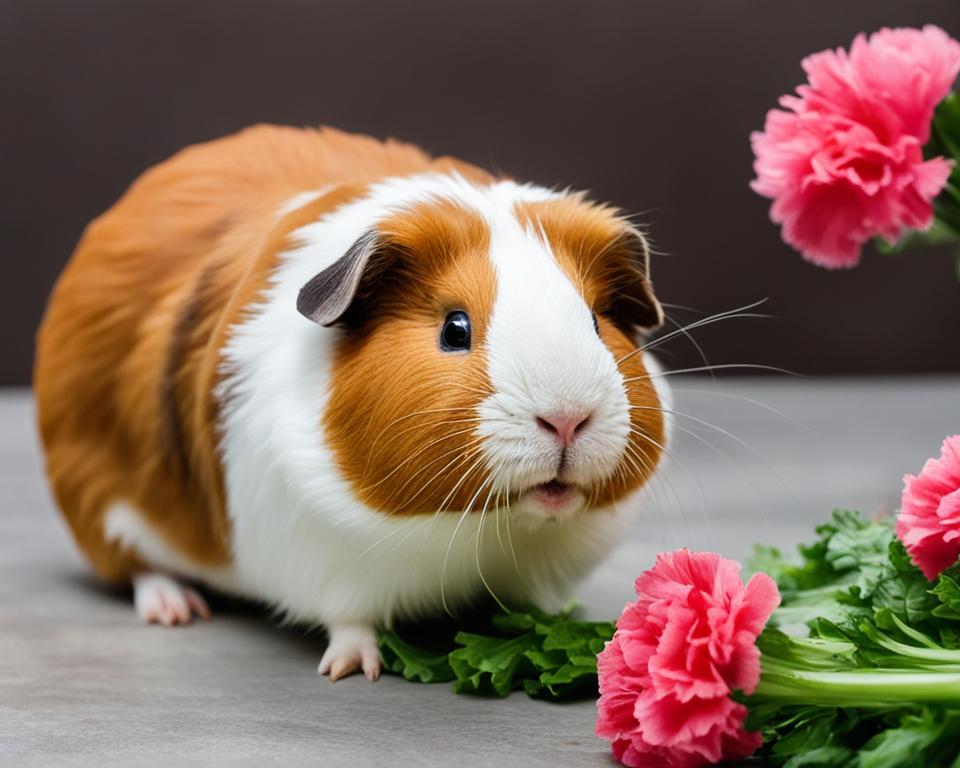
Leave a Reply